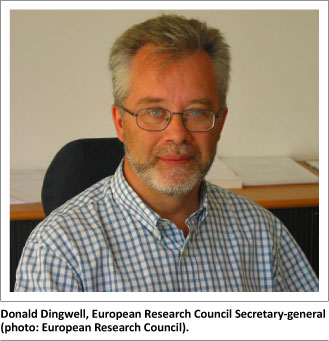Serviços Personalizados
Artigo
Indicadores
Links relacionados
-
 Citado por Google
Citado por Google -
 Similares em Google
Similares em Google
Compartilhar
South African Journal of Science
versão On-line ISSN 1996-7489
versão impressa ISSN 0038-2353
S. Afr. j. sci. vol.108 no.5-6 Pretoria Jan. 2012
NEWS
European Research Council scheme offers opportunities for Africa
Michael Cherry
Department of Botany and Zoology, Stellenbosch University, South Africa
European Research Council (ERC) secretary-general Donald Dingwell visited South Africa in March to promote its grant schemes, which are open to top researchers from any discipline and of any nationality who are prepared - in the event of being funded - to base their research programme at a European institution, and spend at least 50% of their time there. But Dingwell emphasises that while applicants need to find a European institution prepared to host them, they do not have to have a post there, as salary costs can be included in the grant. The ERC is part of the EU's seventh research framework programme and has a total budget of Â7.5 billion for 2007-2013.
ERC offers two core grant schemes: starting grants of up to Â2m over 5 years boost the careers of younger researchers by providing support when they are commencing or consolidating their own independent research programme, and advanced grants support leading advanced investigators to pursue more ambitious and exciting high-risk or high-gain research with up to Â3.5m over 5 years. An additional scheme aimed at achieving synergy across disciplines will offer funding for the first time this year for exceptional proposals from groups of two to four principal investigators who will be expected to be physically located in the same place. The idea is that these groups will be built around specialised infrastructure, form new combinations of skills and disciplines, or bring together researchers from different institutions, sectors or countries.
The ERC schemes are very competitive, with only approximately 12% of applications being successful. Last year, 9% of applications were from outside Europe, and only 6% of applicants were not of European nationality. To date, there have been only 11 applications from South Africans (of which only 1 was successful) and 5 from Europeans resident in South Africa (of which none were successful). In the last 5 years, there have been only four successful applications from Africa: from Morocco, Tunisia, Cameroon (all of whom have joined French host institutions) and South Africa. The successful South African applicant was Chris Henshilwood, who spends half of his time as research chair in the Origins of Modern Human Behaviour at the University of the Witwatersrand, and the other half as Professor of African Archaeology at the University of Bergen in Norway, where he holds an ERC grant to investigate key behavioural innovations in the human past.
Two other ERC-funded projects have research components in South Africa. Maciej Konacki of the Nicolaus Copernicus Astronomical Center in Warsaw aims to detect circumbinary planets around a sample of up to 350 eclipsing binary stars using eclipse timing and precision radial velocities, and to test models of the structure and evolution of these binary stars by characterising them with unprecedented precision. To this end, his team has established a global network of four 0.5-m robotic telescopes located in Australia, Chile and the South African Astronomical Observatory's Sutherland site in the Northern Cape Province.

Brian Chase from the Centre National de Recherche Scientifique in Montpellier seeks to use rock hyrax middens as novel palaeoenvironmental archives to investigate long-term climate change. These stratified accumulations of urine and faecal pellets contain reliable, high-resolution records of long-term climate and vegetation change in southern Africa spanning the last 50 000 years. Chase hopes that these middens will provide insights into rapid climate change events, the extent and phasing of major climatic phenomena, and the direction and potential impacts of future climate change.
 Correspondence to:
Correspondence to:
Michael Cherry
Postal address: Private Bag X1, Matieland 7602, South Africa
Email: mic@sun.ac.za














